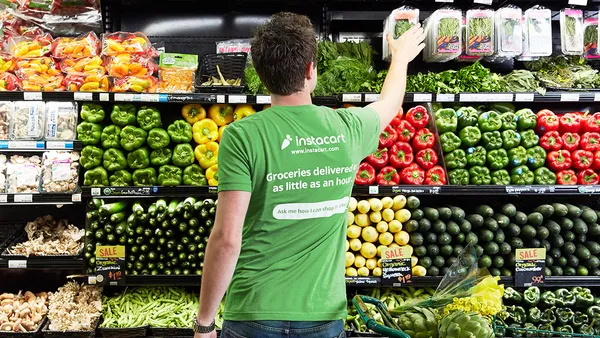Dive Brief:
- Walmart recently filed two patents aimed at boosting innovation in grocery e-commerce, including a temperature-controlled delivery truck and “docking station with removable lockers,” according to Investor's Business Daily.
- These patents were published a few days before Walmart announced its patent application for a virtual showroom and fulfillment center. The patent includes VR headsets and gloves, and would allow Walmart to give shoppers a three-dimensional shopping experience outside of the store environment.
- These patents join other Walmart’s patents for innovative technologies, including a floating warehouse and technology that would allow shoppers to see products in 3-D before buying them.
Dive Insight:
Walmart might not launch VR technology anytime soon, but its drive to innovate and its ramped-up efforts in e-commerce like curbside delivery and same-day delivery show competitors that it’s prepared for a fight.
The retailer giant’s recent delivery vehicle patent, which includes three temperature zones and conveyor belts that move products around, shows Walmart has its eyes set on grocery delivery. The company has quickly expanded home delivery to key markets across the country, with plans to reach 40% of U.S. consumers by the end of the year. At the same time, Walmart is focused on new approaches that emphasize its store primacy and leading position in click and collect. Recently, Walmart launched a pilot in Arizona with self-driving car company Waymo to pick customers up and bring them to a company store.
The grocer’s patent for portable lockers will make it so consumers can rent or own a Walmart storage unit that can be loaded with goods at the store, then carted home. The idea builds on the concept behind Amazon Lockers, which are showing up in Whole Foods stores. The initiative could make store pickup even more convenient, though the company notes it is aimed at city-dwellers that don't have a car — a minority of Walmart customers right now, considering the vast majority of Walmart stores are located outside metropolitan areas.
The retailer's VR technology, meanwhile, could be a major disruptor for the industry if it eventually rolls out — though that seems a long way away. Still, Walmart sees considerable promise in virtual reality. Six months ago Walmart’s innovation wing, Store No. 8, acquired virtual reality technology startup Spatialand.
Walmart’s patents create a lot of buzz, but whether or not they will see the light of day is unclear. The company is known for its willingness to gamble big bucks on experimentation. Last year, the grocer filed a patent for a floating warehouse that would release drones to deliver orders to customers. It seems as though Walmart has created the technology and ideas behind its patents but is waiting for the right time to release it — including instances where it can quickly one-up its competitors like Amazon and Kroger.
Walmart could feel threatened by Amazon and Kroger’s recent innovations. Amazon is pursuing a “blended reality system” to enhance the shopping experience and Kroger just launched a driverless delivery pilot and has partnered with Ocado to build automated warehouses. With its massive scale, talent and investment capital, though, Walmart is going to make sure it's never watching from the sidelines.













